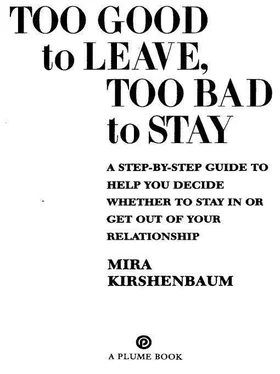Kirshenbaum, Mira - Too Good to Leave, Too Bad to Stay
Здесь есть возможность читать онлайн «Kirshenbaum, Mira - Too Good to Leave, Too Bad to Stay» весь текст электронной книги совершенно бесплатно (целиком полную версию без сокращений). В некоторых случаях можно слушать аудио, скачать через торрент в формате fb2 и присутствует краткое содержание. Жанр: Психология. Описание произведения, (предисловие) а так же отзывы посетителей доступны на портале библиотеки ЛибКат.
- Название:Too Good to Leave, Too Bad to Stay
- Автор:
- Жанр:
- Год:неизвестен
- ISBN:нет данных
- Рейтинг книги:3 / 5. Голосов: 1
-
Избранное:Добавить в избранное
- Отзывы:
-
Ваша оценка:
- 60
- 1
- 2
- 3
- 4
- 5
Too Good to Leave, Too Bad to Stay: краткое содержание, описание и аннотация
Предлагаем к чтению аннотацию, описание, краткое содержание или предисловие (зависит от того, что написал сам автор книги «Too Good to Leave, Too Bad to Stay»). Если вы не нашли необходимую информацию о книге — напишите в комментариях, мы постараемся отыскать её.
Too Good to Leave, Too Bad to Stay — читать онлайн бесплатно полную книгу (весь текст) целиком
Ниже представлен текст книги, разбитый по страницам. Система сохранения места последней прочитанной страницы, позволяет с удобством читать онлайн бесплатно книгу «Too Good to Leave, Too Bad to Stay», без необходимости каждый раз заново искать на чём Вы остановились. Поставьте закладку, и сможете в любой момент перейти на страницу, на которой закончили чтение.
Интервал:
Закладка:
GUIDELINE #20
If you and your partner have passionately felt but profoundly divergent preferences about how to live, and if the lifestyle you prefer is impossible with your partner, and if it’s clear that you’ll be happier living that lifestyle without your partner than living with your partner without that lifestyle, then you’ll be happy if you leave and unhappy if you stay. Quick take: You live a life, you don’t live a relationship.
This guideline is about where happiness and contentment and satisfaction come from in life. They come from the way you live, from the things that are important to you about the way you live. Of course someone you love is extremely important to the way you live, but don’t put the cart before the horse. Your life is your life, and the person you love is a part of your life.
You can allow yourself to choose the life you need to be happy. If your lifestyle difference is not such a big deal or you can accommodate your differences within your lifestyle, then you don’t have a problem. People who break up an otherwise decent relationship for a minor improvement in their lifestyle usually live to regret it. But all by himself your partner cannot make you happy if on the other side of the fence there’s a different way of living that makes all the difference for you.
Robert didn’t give himself the permission this guideline of fers you. He felt guilty at the thought of leaving Agnes, even though she clearly indicated she would choose to be alone rather than go with him to Italy. And, he later realized, he was scared and habit-ridden. So he stayed in his old house in his old city surrounded by all the old reminders of a life he wanted to get as far away from as possible. His early retirement, instead of feeling like a release from imprisonment, felt like a twilight zone, where he was stranded in the middle of nowhere between the life he’d left and the life he wanted.
Agnes blossomed. Her new life was more and more what she wanted it to be. But her happiness didn’t really touch Robert because it wasn’t about them or any life they were having together.
It was in a way like the happiness of a child going off on some trip by itself for the first time. Robert saw her happiness like someone looking through the wrong end of a telescope. For all his success and plans Robert ended up feeling marooned, a stranger stranded in someone else’s life. They’ve stayed together, but to Robert it feels like a mistake.
Yes, life with another person can press our noses against all kinds of irritating differences. But the difference we can’t live with is the difference that’s about how to live.
STEP #21: “I MARRIED A MARTIAN”
Any difference can be annoying, but most differences are either resolvable or ignorable. You can resolve a difference by working out some kind of compromise. You can ignore a difference by just being who you are and doing what you want and paying no attention to the gap between you. Most of the time some combination of love and skill enables you to resolve or ignore your dif ferences. One exception to this is the difference I’ve just talked about, where you differ about the fundamental way you want to live.
Are there any other differences, though, that are so important they transcend your ability to resolve or ignore them?
The Sense of Connection
Yes, there are differences that transcend your ability to resolve or ignore them. These differences have to do with utter, deep-down alienness. If you’ve ever had a cat or a dog, you know how on some level, in spite of your knowing that the two of you are from different species, you have a sense of some shared bond. You both like a good meal. You both like a comfortable place to curl up. You both like physical affection. You both like to play. You both have the capacity to care about each other. This sense of similarity or connection deep down is part of what creates a real bond between you.
But when you start moving away from the dog/cat level toward the chicken/rhinoceros/snake level of existence and then toward the clam/worm/beetle level of existence, at some point the sense of any connection disappears. With the sense of connection, you can share your life with the creature. Without the sense of connection, you eat it or call the exterminator.
The same thing is true with the people we find ourselves falling in love with. Sometimes there’s that deep basic sense of connection, but, surprisingly, sometimes there isn’t. Sometimes we fall in love with someone who’s terribly, horribly, profoundly, unbridgeably different. Yet it’s very hard to see or admit this, because, after all, this is someone you’ve fallen in love with. You could understand falling in love with a dog or cat, but how could you fall in love with a clam or a worm?
It’s easier than you might think. We deceive ourselves, among other things, because we all belong to the same species. You’re physically attracted to each other. You both like the Grateful Dead and both hate Country music. Or you both agree that Dostoyevsky is a terrible bore and a dreadful writer and you both admit to being Nick at Nite fans. Or you both like to sleep with the windows open and hate making love in the morning. All you need, then, is to go shopping for furniture together and have a couple of kids and the fact that you’re actually as alien as two people from different planets who have no interest in each other completely eludes you.
So ask yourself this:
Diagnostic question #21. In spite of all the ways you’re different, would you say that deep down or in some respect that’s important to you your partner is someone just like you in a way you feel good about?
Searching for this deep-down, basic similarity often forces people to look at their relationship with their partner in a completely different way. For example, one woman had been complaining about being a golf and TV-sports widow, about how her husband was a “typical insensitive man.” She was really starting to get carried away with the sense that the two of them were too different to stay together.
Question #21 shed a different light on things. What was undeniable to her was the fact that he believed as strongly as she did that being a good parent was the most meaningful experience they’d ever have. Even though he played golf and watched sports on TV he always made time for the kids—he sought out ways of being with the kids. She knew, beyond question and in spite of all the things about him that annoyed her, that what was most important to her was most important to him.
Proving There’s No Connection. The issue of finding a deep, basic similarity must be handled carefully when you’re afraid there is no similarity between you and your partner. It’s a question of evidence. You can prove a similarity does exist because you see it and feel it. But you can’t prove it doesn’t exist just because you don’t see it and feel it. You can’t prove a negative. To use a common example, we may be sure that unicorns are purely mythical creatures, but who knows?—maybe there are a whole bunch of them somewhere and no one’s found them yet. In the same way, just because on one of your bad days when you’re bummed out about your relationship it feels as though there’s not one single way your partner’s like you—well, maybe there’s a profound similarity somewhere you’ve just overlooked or forgotten.
Trusting Your Feelings
Your feelings have to be your standard here. Do you feel you and your partner are truly similar deep down and in a way that’s important to you? It can’t just be a superficial similarity. There’s got to be something deep down, where your similarity is actually meaningful to you.
Читать дальшеИнтервал:
Закладка:
Похожие книги на «Too Good to Leave, Too Bad to Stay»
Представляем Вашему вниманию похожие книги на «Too Good to Leave, Too Bad to Stay» списком для выбора. Мы отобрали схожую по названию и смыслу литературу в надежде предоставить читателям больше вариантов отыскать новые, интересные, ещё непрочитанные произведения.
Обсуждение, отзывы о книге «Too Good to Leave, Too Bad to Stay» и просто собственные мнения читателей. Оставьте ваши комментарии, напишите, что Вы думаете о произведении, его смысле или главных героях. Укажите что конкретно понравилось, а что нет, и почему Вы так считаете.












